|
 It was a cool end-of-winter drab evening, but
attendees entering the Second Baptist Church in Lincoln experienced
a change of atmosphere inside; great warmth in greetings. It was a cool end-of-winter drab evening, but
attendees entering the Second Baptist Church in Lincoln experienced
a change of atmosphere inside; great warmth in greetings.
The event was promoted by Lincoln Memorial Hospital Community Health
Coalition. Director Angela Stoltzenburg said, Relationships within
families and communities have a strong impact on our health and
well-being."
The most recent data collected in the 2020 Health Needs Assessment
survey showed that 43% of local respondents had witnessed someone
being negatively treated because of their race either sometimes or
frequently. Stoltzenburg said, "We must do better."
When it comes to healing racial divide many people ask, what can I
do?
Talking about our commonalities and experiences is one big piece to
that puzzle. Sharing in a structured clarifying format shows where
racial bias exists. Real people sharing real experiences in a
meaningful dialogue offers comprehension and the chance to address
unfavorable attitudes.
'The Dialogue' included a panel Q&A followed by small group
discussions.
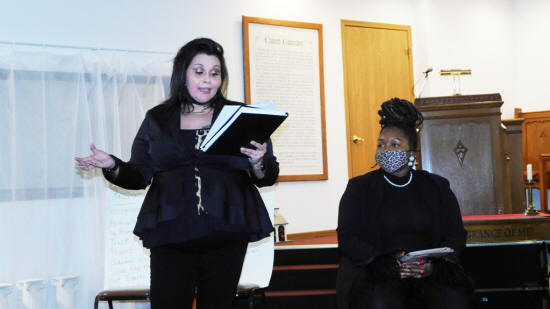
Commission Chairperson Jeanette Harris welcomed
everyone and set the format. Then Jennifer Hunt served as moderator
asking panel members about their experiences in Lincoln.
A set of guidelines was shared on how to respond to the sensitive
information.

Ground Rules:
Listen deeply
Assume the best intentions
Keep an open-mind
Expect and accept non-closure
Expect to experience discomfort
Allow others to learn what you already know
Take care of yourself
Responsibilities:
Recognize
Acknowledge
No Blame
Trust
Respect
Individual Experience
Share the Air
Not Experts
Ask for help
The panelists introduced themselves. They ranged in age with the two
youngest at 13-years of age having lived their whole lives in
Lincoln. Adults included a Lincoln College staff member who works
with black students and the community; a horticulturalist/mom, and a
retired military serviceman/father.

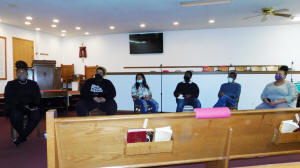
Each of the panelists shared their future goals and
except for the retired person, all plan to a pursuit of higher
education and career advancements. Each placed an emphasis on
community and family. All said they wanted to make Lincoln a better
place for all to live.
The youngest in years proved wise in their knowledge of history, at
interpreting their own experiences and current events.
The Lincoln College employee has witnessed intimidating behaviors in
the community. Most recently he accompanied a few students to an
eatery where the hostess displayed several forms of rudeness that
lead them to leave shortly after being seated.
Panelist shared the injustice felt when people hate you just because
of the color of your skin. One woman carries a depth of hurt started
in childhood from past racial slurs. She does not want that kind of
degradation for children today.
All have physiologically experienced stages of pain and frustration
that lead to anger felt in the body, and have learned to curb their
responses.
Panelists were asked to share the advantages and
disadvantages of being black:
Advantages:
Sometimes the disadvantages create the advantages - you learn
discipline to not retaliate, - work 10 times harder to overcome bias
or discrimination, - you carry on in the face of adversity; this
creates strength and resilience.
Disadvantages:
Frustrations at being prejudged, not taken seriously,
minimized, not trusted, concern for safety.

The prejudicial experiences they each shared ranged
from subtle to overt: a passing muttered racial slur, out loud angry
utterances made by a neighbor, regularly followed closely throughout
businesses, displays of symbols such as a Confederate flag, intended
to be intimidating (micro-aggressions); all undeserved,
disrespectful and rude behaviors.
[to top of second column] |

The most profound statements offered came from the
youngest persons, including a reply to what are some advantages to
being black?
Black women are beautiful.
The black men are "ongoing and strong. The black men I know continue
no mater how hard it is."
Living as a black man: - swag (said with humor and confidence this
brought chuckles,) - freedom to know you are judged but it is by a
select few, going through difficulties makes stronger.
The panelists' thoughtful responses offered a depth of insight into
the challenges of going out into our community each day visibly as a
minority.

A panelist said, "This is not something that happens once every full
moon. It is a daily. We wake up in this skin - we wake up black - we
shower black - we eat black - we drive black - we go to the store
black."
Turnaround questions:
How can our community address thoughtless wrong behaviors?
What part can I play?
When you see something wrong, say something. Silence is complicit,
it speaks even louder endorsing wrong behavior.
When it is safe to respond, calmly say to an offensive person, "What
you are doing is not ok."
Help children and neighbors get through these challenges.
What can black people do:
Keep the train moving, when talks begin, don't stop for
uncomfortable moments.
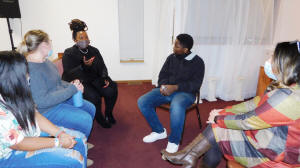
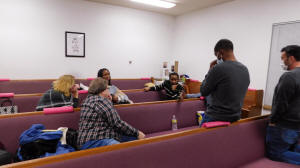
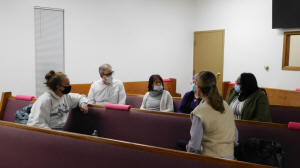
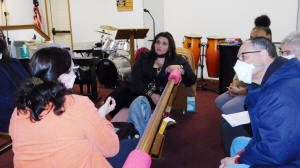
After the one hour panel presentation the room was divided into
groups to discuss what each person heard.
There's an old adage, "When you know better, you can do better."
Many people are unaware of how their words or behaviors, or lack of
response impact others and may not even realize they themselves make
judgments of others on their looks. A few of the public commented
they came to the gathering to check themselves.

A retired woman said she had gone on a trip to another country where
she was visibly a minority. She then understood the pressures and
potential danger in being a minority. She wanted to check how she
comes across to others in minority here at home.
Another woman does a lot of community work and wanted to better
understand the community needs. She's acquainted with some of the
stereotyping and cultural bias that minorities here in Lincoln
experience.
The evening closed out with a surprise bonus. Elite Kicks supplied a
$50 gift certificate. Cindy Smith was thrilled when her ticket was
drawn making her the winner to shop one of Lincoln's newest and the
best athletic shoe business.
The new Elite Kicks Shoe Store is located at 130 Chicago Street,
Lincoln. It is locally owned by Mario Canon, Nick Cummings, Dave
Duncan and Ron Olthoff.
Keeping the momentum of the work in our community and everywhere is
important. At evening's end, all present for 'The dialogue' heartily
agreed, more talks are needed.
In a kind, firm and gentle voice Harris summed up the challenges
presented by racism, "A lot of people make it about black and white,
but it's about what's right and what's wrong."
[Jan Youngquist] |